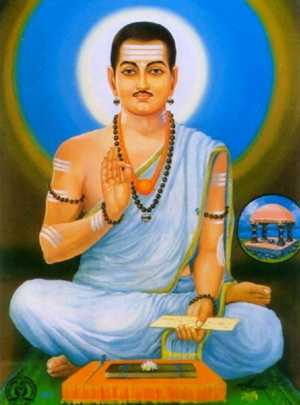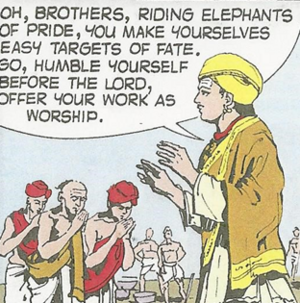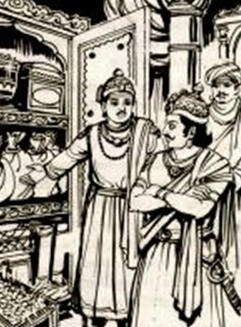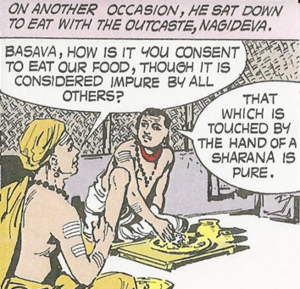Talk:Bāsaveśvara: An Avatāra of Nandī
By Vishal Agarwal
Even today, the Śaivite of Tamil Nadu commence their prayers to Śiva with twelve hymns, of which the ninth is the one sung by Centhanar during the Chidambaram chariot festival.
In the Indian state of Karnataka, around the year 1105 CE, a noble couple visited a mandir of Śiva and prayed for a son. A few days later, while the wife was meditating in front of the mūrti of Nandi, she saw a light emerge from it and merge into her. Several months later, she gave birth to a baby boy. They named him Basava another name for Nandi.
From birth, Basava neither spoke, cried, laughed, nor opened his eyes. His parents grew worried. One day, a visiting sādhū explained, “Basava does not speak because he has been in meditation since he was born. I will bring him out of meditation.” The sādhū then chanted Om Namaḥ Śivāya into Basava’s ear. Immediately, the child opened his eyes. From that day on, he behaved like a normal child, but remained deeply devoted to Bhagavān Śiva.
As a boy, Basava was pained to see that some people were denied entry into Śiva’s temples. Believing that all bhaktas of Śiva are equal in Bhagavān’s eyes, he refused to wear the sacred thread across his left shoulder, unlike other brāhmaṇas of his time. He did not want to appear as a superior brāhmaṇa compared to other Śiva-bhaktas. At a young age, he studied and mastered the Śāstra under a guru named Jātaveda.
In adulthood, Basava moved to Kalyāṇa, where he entered the service of King Bijjala. One day, an inscription was found, written in an ancient language that no one could read. Basava stepped forward and read it aloud it revealed that a treasure was buried under the king’s throne. When the throne was moved and the spot dug up, a great treasure was indeed found.
King Bijjala, impressed by Basava’s learning and honesty, appointed him as treasurer, asking him to use the wealth for the good of the people. Basava employed workers to dig tanks and canals so that water could be stored and used for growing more food. He insisted that everyone, whether priest, rich man, or poor labourer, must work with their own hands. Some hesitated, saying, “We are rich and born in noble families. It is beneath our dignity to labour like common workers.” Basava replied, “Working with one’s own hands is the best worship you can offer to Śiva. No one should live off the hard work of others.”
During a severe drought in the kingdom, Basava used large sums of money to feed the starving people.
Every evening, Basava held gatherings where all followers ate together as equals, regardless of caste or wealth, and discussed spiritual matters. This angered some members of society, who complained to the king. They accused Basava of misusing treasury funds, but an audit proved his honesty, and King Bijjala gave him even more funds to continue his work.
On one occasion, during a race of bulls attended by the king, a child wished for his clay toy bull to join the race. While others laughed, Basava blessed the toy bull in the name of Śiva, and miraculously, it ran and defeated all real bulls. This miracle confirmed Basava’s saintliness in the eyes of many.
Basava taught that it is better to give up evils such as anger and greed than to perform expensive rituals without inner purity. His central message was that love for Śiva and good character are what make a person great, not wealth or birth. He strongly opposed untouchability, ate with so-called ‘untouchables,’ and encouraged inter-caste marriages among his followers.
Once, when accused in the king’s court of eating at the home of an ‘untouchable’ śaraṇa (devotee of Śiva), Basava declared, “The same blood flows through the body of an untouchable as through a brāhmaṇa. This śaraṇa is a great bhakta of Śiva and therefore superior to so-called brāhmaṇas without devotion.” When mocked about whether milk flowed in the veins of the untouchable, Basava cut the tip of the śaraṇa’s finger, and to everyone’s astonishment, milk, not blood, flowed out. This miracle silenced his critics.
Despite his miracles and teachings, many in society resisted his message of equality. Facing constant complaints to King Bijjala, Basava eventually left Kalyāṇa and moved to the Śiva mandir at Kudala Saṅgama, where he spent the last days of his life.




